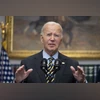By Josh Wingrove and Mackenzie Hawkins
The Biden administration is rolling out measures to bolster US automotive manufacturing and artificial intelligence development, as it looks to sharpen curbs on Chinese technology and tee up potential restrictions for Donald Trump, to enact.
A rule was finalized on Tuesday that effectively bans new, personal smart cars from China and Russia and US officials announced that they intend to launch an inquiry to expand those restrictions to commercial vehicles like buses and trucks.
The administration also unveiled a long-awaited executive order on artificial intelligence, opening the door to leasing federal land for companies that agree to build massive AI data centers. That effort complements fresh trade restrictions announced Monday that curb the sale of AI chips from Nvidia Corp. and others to data centers around the world.
President Joe Biden in a statement Tuesday said the US “cannot take our lead for granted” in the development of AI.
Also Read
The executive order on data centers would “accelerate the speed at which we build the next generation of AI infrastructure here in America, in a way that enhances economic competitiveness, national security, AI safety, and clean energy,” he said.
The moves set the stage for Trump to chart his own course on China policy. His incoming administration could reverse some of Biden’s latest steps — though the smart car ban would take time to unwind — and would have to decide whether to finalize other measures.
Still, Biden’s team expects that compared to other areas, Trump will maintain some level of policy continuity with respect to China — the world’s second-largest economy — given broad bipartisan agreement on the national security risks posed by Beijing’s technological ambitions.
The AI measure calls for the departments of Defense and Energy designate a total of six federal sites for data center development, with accelerated environmental permitting — especially for associated geothermal energy projects.
Companies must cover the full costs of building those sites, find new clean energy sources to meet their needs, and purchase an “appropriate share” of semiconductors made in the US. They’ll also have to evaluate the national security implications of AI models developed on government property, the White House said Tuesday.
The automobile policy, which has been in the works for roughly a year, prohibits the import or sale of connected vehicles with specific pieces of hardware or software that have a “sufficient nexus” to China or Russia or the sale of those components separately. It also bans manufacturers with links to Russia or China from selling US-made vehicles within the US.
US officials say modern vehicles that have devices which connect them to the internet are akin to computers and can potentially gather sensitive data — including about drivers or owners — infringing on consumer privacy, or allow foreign adversaries to remotely manipulate cars.
“We’ve had a strong focus on investing in critical technologies and the domestic sectors that are important for national security and economic competitiveness,” Navtej Dhillon, deputy director of the National Economic Council, said in an interview. The goal is to ensure “the US retains its leadership and we are not opening ourselves up to a new China shock in these critical sectors.”
Dhillon said the intention was to avoid a situation where “our supply chain becomes more dependent on Chinese sources and it becomes more difficult to address the economic and national security risks.”
The administration has also initiated an investigation that could lead to new tariffs on Chinese semiconductors, and officials are racing to finalize a cybersecurity executive order that is in part a response to a major hack attributed to China.
The recent series of regulations comes on top of years of China-focused trade rules and industrial policy measures, including sweeping restrictions on the sale of advanced chips to China and subsidies to boost American manufacturing of chips, batteries and clean energy technologies.
“The question is, in long term strategic competition with China, are we in a position of confidence and capacity? Are we in a stronger position in that competition than we were four years ago?,” White House National Security Advisor Jake Sullivan told Bloomberg News in an interview Monday.
“I think it’s not even a close call,” Sullivan said. “The United States is in such a stronger position today than we were four years ago.”

)